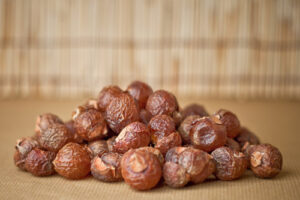 Soap nuts, also known as Reetha or Saponin-rich nuts, are the dried fruits of the Sapindus tree, which is native to parts of Asia, including Nepal, India, and other regions of the Himalayas. Despite their name, soap nuts aren’t actually nuts in the botanical sense—they’re fruits that contain a natural detergent-like substance called saponin.
Soap nuts, also known as Reetha or Saponin-rich nuts, are the dried fruits of the Sapindus tree, which is native to parts of Asia, including Nepal, India, and other regions of the Himalayas. Despite their name, soap nuts aren’t actually nuts in the botanical sense—they’re fruits that contain a natural detergent-like substance called saponin.
When soap nuts are soaked in water, they release saponins, which create a soapy solution that can be used for cleaning, washing, and other purposes. The saponin in soap nuts has foaming and surfactant properties, making it an effective natural alternative to chemical-laden detergents.
Key Characteristics of Soap Nuts:
-
Natural Cleaning Agent: Soap nuts can be used to wash clothes, dishes, and even as a shampoo for hair. They act as a gentle and eco-friendly alternative to conventional detergents, which can contain harsh chemicals.
-
Eco-Friendly: Since soap nuts are completely natural, biodegradable, and chemical-free, they are an environmentally sustainable product. They don’t pollute water sources like synthetic detergents can.

Premium Soapnuts Store in the UK -
Gentle on Skin: They are hypoallergenic and safe for people with sensitive skin, making them ideal for babies or people with skin conditions like eczema.
-
Multiple Uses: Apart from being used as a cleaning agent, soap nuts have been used in traditional medicine for various ailments, including skin conditions, dandruff, and digestive issues.
-
Saponins: The key ingredient in soap nuts, saponin, is what gives them their soapy texture when dissolved in water. Saponin is a natural surfactant, meaning it can help to break down oils and grease, making soap nuts effective for washing and cleaning.
